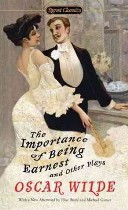 Oscar Wilde •
Oscar Wilde •
The Importance of Being Earnest •
Oscar Wilde—like Shakespeare—is better on the stage than on the page. But if this repertory company staple doesn’t happen to be playing near you at the moment, pick up the print version for an afternoon’s sheer delight.
The play’s premise is downright hackneyed: Two young London gentlemen face and overcome obstacles to winning the ladies of their choice. What Wilde does with this trite framework is another matter altogether.
This is Wilde’s tour de force, and he burnished every line of dialogue with that much-vaunted wit. (Passing through customs in New York, the author is supposed to have said, “I have nothing to declare but my genius.”) The result is a sparkling comedy of manners that has kept audiences roaring for well over a hundred years. “Good heavens, Gwendolen” gets me every time, even though I know it’s coming.
Wilde takes fiendish glee in lampooning the conventions of his period, from the ubiquitous three-volume novel to the Victorian obsession with propriety and breeding. His characters are pure stereotypic bliss: upright, respectable Jack, who nonetheless manages to lead a double life; sweetly virginal Cecily with her X-rated imagination; Algernon, the charming, foppish rogue she falls for; and haughty, imperious Lady Bracknell, who has no intention of letting her daughter “marry into a cloak-room, and form an alliance with a parcel.”
Where does Ernest figure in all this? What is the secret of Bunbury? How did that baby wind up in a handbag left at Victoria Station (the Brighton line)? And why aren’t there any cucumber sandwiches for tea?
I’m not telling. You’ll have to read the play for yourself, or better yet, catch a performance.
Long live Oscar Fingal O’Flahertie Wills Wilde.







Your email address will not be published.